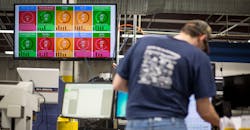Machine Monitoring: The Strategy to Achieve Exponential Efficiency Gains
Since the industrial revolution, manufacturers have been churning out goods which have bettered the livelihoods of billions of people. Machines have been fed raw material and transformed them into finished goods hundreds or thousands of times more valuable. The engine of society has hummed along; manufacturing powered the transformation of mankind’s way of living the last few centuries.
With the birth of the “information age”, a new paradigm has emerged. Instead of physical, tangible objects, our most valuable assets now are ethereal and exist solely in the digital realm. Information is king – knowledge about individuals, organizations, and groups can now refine existing processes to be thousands or millions of times more effective. Information can guide us in what decisions to make, cutting out the many headaches involved with trial and error. “Life experience”, so famed by oracles old and new, can now partially be substituted by rigorous, data-driven insight.
We may wonder why companies like Blockbuster and Borders are no longer around, replaced by such behemoths as Netflix and Amazon. From the lens of the generation who has experienced the greatness of both, the answer is obvious. The former group failed to embrace the new age we’re all living in, eschewing and denying the power of information and the new rules forged by the digital age. Netflix, Amazon, and these so called other “digital natives” are built from the ground up with data. Data informs how they target recommendations, how much they can demand from vendors, and how much they can charge the market without losing revenue.
In the days of yore, these decisions were driven primarily by “gut feel” or “business experience”, which is another way of saying “I’ve wined and dined enough people to get the inside scoop on things”. The old guard kept a lockdown on industry through their exclusive clubs, associations, and golf outings. What did people wish to gain from such networks? The answer is information.
Information about how someone else’s factory was doing, about how business conditions were in another part of the world, about which schools and companies were best to hire from. But now, this information has been democratized and stored not in minds, but in databases, held largely by private companies who had the wherewithal to figure out how to systematically gather or intelligently infer this information.
Manufacturing stands, as a whole, to benefit from such changes. Here are a few examples from 2019’s World Economic Forum report on Industry 4.0 on how to achieve these benefits:
1. According to the World Economic Forum, machine monitoring has decreased unexpected breakdowns by over 60%. By providing the capability to visualize what's going on on the factory floor, manufacturers can now easily identify systematic patterns leading up to breakages and/or undertrained employees who may not be able to fully operate the equipment. Downtime Pareto charts aggregating information output by machine alarms or input by operators on the shop floor can give you a quick view into what's really driving costs up in your factory so you can have a data-driven approach to remedying issues on the shop floor.
2. Sensor and control-based reporting of KPIs "has allowed for digitization of any kind of production machine along with real-time collection of production data, which is used to build dynamic, interactive dashboards." By knowing things like feedrate overrides and utilization by shift/operator/machine, you can slice and dice the data the way you want to for maximum insight into your operations.
3. Finally, traditional methods such as statistical process control (SPC) can be driven live by actual data streaming off your machines. For discrete manufacturers, cycle times output by machines can be immediately and directly plotted to a continuously updating SPC chart, rather than relying on manual processes that introduce lag, human error, and inconsistency.
Instead of under-utilized machines and wasted man-hours, we can now introduce systems that maximize capacity utilization and align our labor and our capital. By leveraging data and the insights we can gather from data, there is no limit to the efficiencies we can gain from embracing the digital age.
Lou Zhang is the chief data scientist for MachineMetrics and will be speaking at the Manufacturing & Technology Conference & Expo at 9 a.m. about how digitally transformed machine shops gain a competitive advantage through seeing more data. He will also be sharing insights from real-data driven benchmarking reports on machine performance, a discussion not be to be missed by anyone with a vested interest in the machining industry. Register for the entire conference or a complimentary expo pass here.

